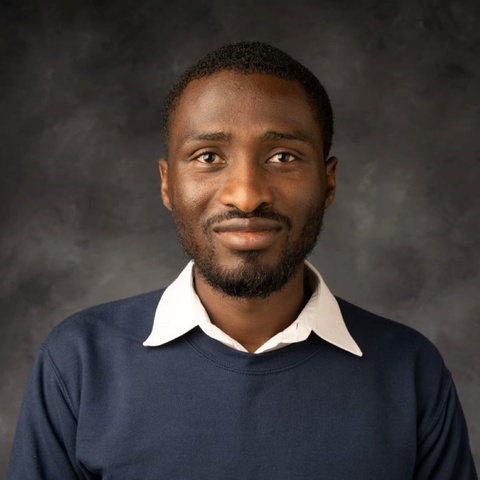
Azeez Alade, a native of Lagos, Nigeria, recently graduated from the University of Iowa with a PhD in epidemiology. He will soon start a clinical fellowship position at the National Institute for Dental and Craniofacial Research (NIDCR) at the National Institutes of Health (NIH) in Bethesda, Maryland.
Alade received a Bachelor of Dental Surgery from the University of Lagos and worked as a dentist intern and general dentist for multiple years. During that time, he met Dr. Azeez Butali, a faculty member at Iowa and an alumnus of his alma mater.
“I discussed my career aspirations with Dr. Butali and expressed my desire to bridge my knowledge of basic science research in physiology with my clinical expertise as a dentist,” recalled Alade. “We kept in touch, and when it was time to apply for postgraduate studies, Dr. Butali recommended the epidemiology program (genetic epidemiology track) at Iowa. After reviewing the program curriculum, I realized it aligned perfectly with my goals, which led me to apply.”
Once at Iowa, Alade approached professors and potential mentors whose research interests and career trajectories resonated with his own. He approached them professionally, stating his intentions and demonstrating genuine enthusiasm for their work. As a result, Alade had the opportunity to work with professionals from different disciplines including, but not limited to, public health professionals, dentists, and molecular biologists in a highly collaborative environment.
“This really fostered creativity and innovation, and shaped me into a well-rounded researcher."
Alade advises fellow international students to acknowledge the differences between the educational systems here and in their home countries, and to actively seek and utilize the available support systems, such as attending office hours and utilizing writing centers when needed.
“I encourage participation in activities organized by student bodies, especially international student organizations, where they can connect with others who have undergone similar experiences and exchange ideas,” said Alade. “Finally, it is important to remember that academic success is often a reflection of our overall well-being. Therefore, it is essential to strike a balance between academics and life.”
This advice is based on the fact that Alade wished he had more opportunities to engage with individuals from diverse cultural backgrounds.
“Given that I began my program shortly before the pandemic, my ability to interact with people at a personal level was limited,” reflected Alade. “Also, there were community engagement opportunities that I wish I had applied for with hindsight.”
Looking ahead, Alade envisions himself as a clinician-scientist, who can translate research findings to improve patient care. Having benefited from the mentorship and opportunities received at Iowa, Alade is determined to pay it forward by mentoring aspiring scientists in need of guidance.
International Programs (IP) at the University of Iowa (UI) is committed to enriching the global experience of UI students, faculty, staff, and the general public by leading efforts to promote internationally oriented teaching, research, creative work, and community engagement. IP provides support for international students and scholars, administers scholarships and assistance for students who study, intern, or do research abroad, and provides funding opportunities and grant-writing assistance for faculty engaged in international research. IP shares their stories through various media, and by hosting multiple public engagement activities each year.